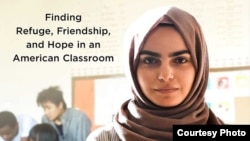Journalist and writer Helen Thorpe spent one school year in a classroom with immigrant and refugee students from various cultures who were just learning to speak English.
She watched them overcome challenges and work hard to succeed in school and beyond. Thorpe shares their stories in a new book, The Newcomers: Finding Refuge, Friendship and Hope in an American Classroom.
Tearing down barriers
Sitting in Room 142 at South High School in Denver, Colorado, Thorpe had an opportunity to meet the world.
The class included 22 foreign students from countries such as Mozambique, Burma, Eritrea, El Salvador, Mexico, Iraq, Congo, Bhutan, Tajikistan and Mauritania.
"They had ... the ordinary struggles of the teenagers everywhere, plus this extra added burden of being in a new country and trying to figure out a new culture and trying to figure out a new language, all at the same time," Thorpe said.
The 22 students spoke 14 different languages.
"Many of the students were the only one in the room who spoke a certain language," she added. "The majority of the students were very isolated in the classroom and in general, in their new life in America. They weren't able yet to make friends because they were just starting out learning English. So, that loneliness is something that they all were struggling to overcome."
But as time went by, they were able to overcome it.
"I watched this loneliness dissipate and go away as they figured out they could use Google Translate to send and text messages back and forth from their home languages to another person's home language," Thorpe said.
What these students were hungry for, she said, was to learn how to speak, to feel like they were accepted at their new high school, and to feel that they belong to a community.
Comfortable in their own identity
In her book, Thorpe details some of the challenges many of these students faced.
Iraqi sisters Jakleen and Mariam struggled with difficult memories. Thorpe learned they had witnessed a car bombing.
"When their family fled from Iraq, they went to Syria. They survived the Syrian civil war, as well as the Iraq war. Their father vanished during that time, their mother became a single parent. She struggled to keep the girls safe. They fled to Turkey. Then she got a chance to resettle here in the U.S.," Thorpe said.
Coming to the United States was the first opportunity the sisters had in a decade to live in a safe home. However, they faced a new challenge: how to define their identity.
"One of the two girls wore a headscarf, covered her hair, and because of that she encountered a lot of prejudice here," Thorpe said. "So, the difficulty of settling in in the U.S., fitting in in America, becoming an American, for her, especially, was daunting because people were belittling her heritage all the time."
However, as her classmates got to know her, they started to understand, accept and respect her, which helped her define her identity and fit in.
Second chance at education
Many students in the class had missed a lot of school, so they had to work hard to succeed once they were back in a classroom.
Solomom and his brother Methusella grew up on the eastern side of the Democratic Republic of Congo. Armed conflicts forced their family to flee to a refugee settlement in Uganda.
"They stayed there for seven years," Thorpe said. "Their whole extended family made this journey. Then, just Solomon and Methusella, their siblings and their parents were the only members of their extended family to get the chance [to come to America]. They were desperate to have a better lifestyle, a chance to stay in school, but at the same time they felt a little bit guilty that the rest of their family didn't get the same chance they had been given."
Methusella will graduate from high school next year. He credits his classmates and his own determination with helping him succeed.
"The first time I stepped into the classroom, I was asking myself, why I'm here and I realized I'm here to learn," he said. "I thought it was a chance for me to step up and fulfill my dream, have a good education and succeed. And I learned mostly from the students I met in school, in the cafeteria, while eating lunch with them."
His brother Solomon says that wasn't easy.
"I wasn't speaking any English. I couldn't even say, 'Hi,' " Solomon recalled. "We used to push ourselves, to go to the cafeteria and sit with other students and try to make a conversation. At the beginning, we were just sitting, looking at each other. We tried our best just to say 'Hi.' "
Gifted teacher
Solomon says one of their teachers, Eddie Williams, was friendly, persistent and patient, and encouraged them to learn.
"We had a nice teacher who liked to teach and he knows how to teach," he said.
Thorpe said Williams is an extraordinary teacher. "His greatest skill was working one-on-one with individual students."
In her book, she explains how the English Language Acquisition teacher kept each student interested in learning and working to reach his or her potential.
"He really wanted to make sure that all the kids in his care understood that if they didn't know English when they walked into his room, that was perfectly OK with him," she added. "And he understood that they, nonetheless, were highly intelligent and possibly speaking other languages and he would appreciate them and show them respect and dignity."
Thorpe notes that while South High School gave the newcomers the chance to gain knowledge, they gave their classmates the chance to learn about the world.





